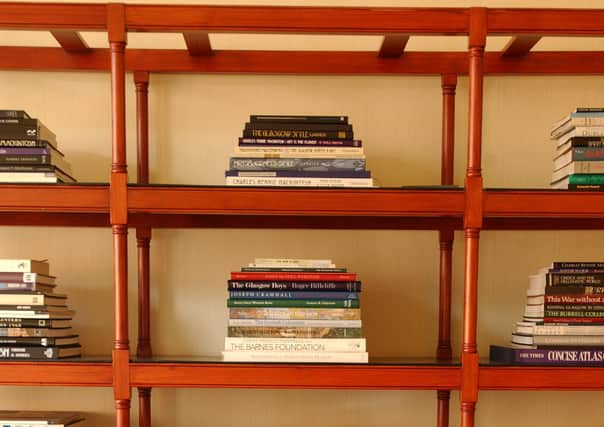Alexander McCall Smith: More advice about what to do in the lockdown


Newspapers and magazines have been full of advice as to what we should read in our enforced isolation. There is also plenty of advice on films we should watch, music we should listen to, and innovative meals we can cook for ourselves with dwindling store-cupboard supplies. There has also been a great deal of useful advice on the cleaning-out that many of us are undertaking. There is scarcely anybody who isn’t using this period to sort out the house or flat. Cupboards that have remained closed for years have been opened and long-lost items discovered and dispatched. Rarely have spring cleanings been so thorough.
Recommending that people should buy more books is, of course, very good advice indeed. But it does carry with it a certain responsibility to extend the advice to include what to do with the books once they have been read, or, in the case of some books, after the reader has tried to read them and then failed. There are certain books that fall into that latter category because they are books that we all feel we should possess, but that most of us are incapable of understanding or, in some cases, lack the willpower to read from cover to cover.
Advertisement
Hide AdAdvertisement
Hide AdThe best-known example of that category of book is Stephen Hawking’s A Brief History of Time. That very worthy book that has been printed, and bought, in its millions. It has also been widely translated and has appeared in virtually every list of indispensable books of the 20th century. However, that is not the same thing as being read, and indeed A Brief History of Time is thought to have the distinction of being the most bought but most unread book ever. This is nothing to do with Professor Hawking’s style, but has to do with the complicated nature of the ideas he addresses. Most of us are simply not equipped to understand these, and were not greatly helped by the various simplified guides to the book which, once again, were bought in large numbers but remained widely unread for the same reason.
Nothing is wasted
In everybody’s private library, then, there are likely to be books that we have at some time thought we should read, but have failed to do so. War and Peace is another of these. The excuses for not reading that, of course is different: you may legitimately not read War and Peace because you know how it is going to end. Plot spoiler: Napoleon retreats.
Now is unquestionably the time to sort out the books in your house. A Brief History of Time and War and Peace should be located, and then placed in the charity bookshop pile. Charity bookshops, of course, have more copies of these books than they can possibly sell, but have arrangements with paper recycling firms to deal with the problem. Both these titles are pulped in very large numbers and then made into copies of Anna Karenina. When these are returned to the charity shops, they are again reprocessed and emerge as copies of Fifty Shades of Grey, which are duly recycled into those large rolls of paper towel that are so useful in the kitchen. Nothing, you see, is wasted.
Once you have deal with A Brief History of Time, you will be ready to try to impose some semblance of order on your bookshelves. Your shelves will have been thinned by the abstraction of A Brief History of Time, and related titles, but you are likely to discover that years of careless reshelving have resulted in a complete lack of order. Now that you have the time to attend to these housekeeping tasks, you will at last be able to rearrange your books in such a way as to enable you in future to find the title for which you are looking. But what system should you follow in doing this? Professional librarians have such things as the Dewey Decimal System, but these are unintelligible to most of us and a simpler, more intuitive system should be used.
Geographical system
A very basic system might involve dividing book into big books and small books. This would result in big books being shelved sideways at the bottom of the bookcase, with smaller books going in at the top. That works, as long as you can summon up a mental picture of the book you are looking for and work out therefore where it might be. Greater sophistication is required, and so you may be tempted by a system that divides your books into: books read; books not read but possibly to be read in the future; books not falling into either of those categories but not yet to be given to charity shops. There might be further categories, including: books by friends, books by enemies, and books by authors whose names you have forgotten.
There have been many other systems applied in this vexed area of the arrangement of books. Some straight-laced Victorian book collectors used to separate books by male authors from books by female authors – on the grounds of the inappropriateness of having the two sitting side-by-side on the same shelf. The late Alistair Cooke used to organise his books on America according to physical geography: books on the northern states would be on the top shelves, while books on the American south would be at the bottom. Books on New York would be on the right, and books on California on the left – and so on. Merit may also be the basis of classification: a library organised on such a basis would have excellent books all shelved together at one end and ephemera at the other.
Health and safety issues lurk in all this. Books are heavy, and there have been recorded cases of people being seriously injured by falling volumes of encyclopaedias. For this reason, it may be wiser to do none of what is recommended above, and leave your books where they currently are. After all, there are other things to do and, as a last resort in these times of seclusion, one might even try reading.
Comments
Want to join the conversation? Please or to comment on this article.
